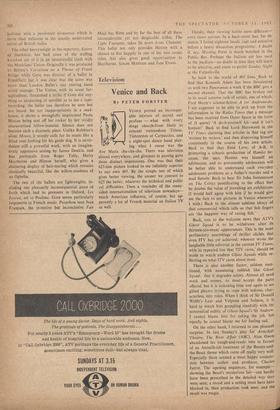Television
Venice and Back
By PETER FORSTER
VENICE proved an incompar- able mixture of sacred and profane — what with every dingy church-front likely to conceal tremendous Titians, Tintorettos or Carpaccios, and a night-spot dance band play- ing what I swear was the Ave Maria cha-cha-cha. There was television almost everywhere, and glimpses in passing gave three distinct impressions. One was that their 625-line picture looked to me infinitely superior to our own 405. By the simple test of which gives better viewing, the sooner we convert to 625 the better, whatever the technical and politi- cal difficulties. Then a reminder of the many- sided internationalism of television nowadays— much American influence, of course, but ap- parently a lot of French, material on Italian TV as well. Thirdly, their viewing habits seem different— even more serious. In a back-street bar, for in-
stance, I found eighteen locals, rapt and attentive
before a heavy discussion programme: I doubt if, say, Meeting Point is much watched in the Public Bar. Perhaps the Italians are less used to the medium—no doubt in time they will learn to be selective, and come to prefer Sunday Night at the Valpolicella.
So back to the world of 405 lines. Back to find that Kenneth Adam has been threatening
us with two Panoramas a week if the BBC gets a
second channel. That the BBC has broken out in its usual autumn rash of serials, one of which,
Fred Hoyle's science-fiction A for Andromeda, I am' supposed to be able to pick up from the information in the Radio Times that a message has been received from Outer Space in the form of (I quote) 'A do-it-yourself kit—and it isn't
human!' Back to find Lord Harewood in the
TV Times claiming that articles in that rag are 'written by writers,' and then disproving himself
consistently in the course of his own article.
Back to find that Enid Love, of A-R, is promoting a schools production of Hamlet be-
cause, she says, Hamlet was himself an adolescent, and so presumably adolescents will be better able to understand such everyday adolescent problems as a father's murder and a
mad fiancee. Back to hear Sir John Summerson on The Critics pontificating to the effect that
he doubts the value of travelling art exhibitions.
(I would half agree with him if he would give me the fare to see pictures in Venice whenever I wish.) Back to the almost sublime idiocy of that commercial which tells us that fish fingers are 'the happiest way of eating fish.'
Back, too, to the welcome news that ATV's Ghost Squad is to be withdrawn after its
thirteen-too-many appearances. This is the most
perfunctory assemblage of thriller cliches that even 1TV has yet achieved; whoever wrote the laughable little editorial in the current TV Times, with its repeated line that 'ITV cares,' should be made to watch endless Ghost Squads while re- flecting on what ITV cares about most.
There is also another factor, seldom men- tioned, with nauseating rubbish like Ghost Squad: that it degrades actors. •Almost all need
work and money, so must accept the parts offered, but it is sickening time and again to see
gifted players trying to cope with tedious, char- acterless, tiny roles. When I think of Sir Donald Wolfit's Lear and Volpone and Solness, it is hard to watch hint grappling manfully with the nonsensical nullity of Ghost Squad's Sir Andrew. I cannot blame him for taking the job, but equally he cannot blame me for feeling sad.
On the other hand, I returned to one pleasant surprise. In last Sunday's play for Armchair Theatre, The Rose Affair (ABC), Alun Owen abandoned his rough-and-ready vein in favour of an Anouilh-ish treatment of the Beauty-and- the-Beast theme which came off really very well. Especially there seemed a most happy conjunc- tion between author and producer, Charles Jarrot. The opening sequences, for example— showing the Beast's mysterious lair—can hardly have been prescribed in the detailed way they were seen; a mood and a setting must have been blocked in, then production took over, and the result was magic.






































 Previous page
Previous page